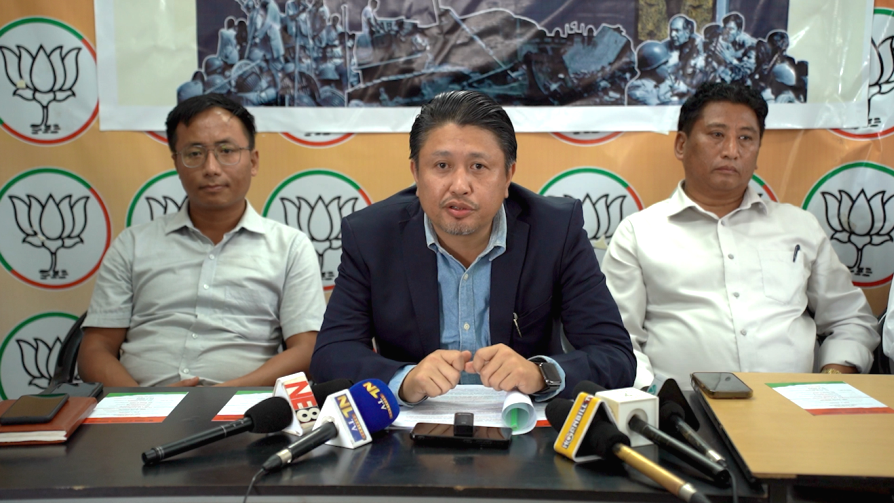As the Bharatiya Janata Party (BJP) observed the 50th anniversary of the Emergency imposed by the Indira Gandhi-led Congress government in 1975, BJP Nagaland leaders strongly criticised the Congress party, describing the Emergency as an attack on democracy.
Share
DIMAPUR — As the Bharatiya Janata Party (BJP) observed the 50th anniversary of the Emergency imposed by the Indira Gandhi-led Congress government in 1975, BJP Nagaland leaders strongly criticised the Congress party, describing the Emergency as an attack on democracy.
Addressing media persons at the state BJP office in Dimapur on Wednesday, Minister for PHED Jacob Zhimomi and BJP state vice president H Haiying described the Emergency as a “dark chapter” in India’s democratic history.

While the Emergency was imposed at midnight on June 25, 1975, under the pretext of internal disturbance, he asserted that the move was not due to war or rebellion but a desperate bid to retain power after Indira Gandhi’s election was annulled by the courts.
He alleged that the Congress government “trampled democratic institutions” and “crushed press freedom, judicial impartiality, and the fundamental rights of citizens,” clearly showing that whenever their power is threatened, “they do not hesitate to disregard the Constitution and the soul of the nation.”
According to him, even after 50 years, the Congress party continues to exhibit the same mindset. The methods have changed, but the intent remains equally dictatorial, he maintained.
Zhimomi took a dig at Congress leader Rahul Gandhi, who he said, is pretending to fight for social justice and the rights of the poor. Gandhi, he went on to say, “Conveniently forgets that it was his grandmother, Indira Gandhi, who ordered firing on poor people at Delhi’s Turkman Gate during the Emergency.”
“This was Congress’ brutal way of fulfilling its Garibi Hatao slogan,” he added.
Referring to the Shah Commission’s findings post-Emergency, Zhimomi alleged that the Congress government even dissolved the Press Council of India to stifle criticism and that censorship was used to silence the media. “Ironically, the same Congress that muzzled the press now protects those spreading fake news while filing cases to suppress the voices of ideological opponents,” he remarked.
He also criticised the invocation of Article 352 by Indira Gandhi under the guise of “internal disturbance,” describing it as a misuse of power to nullify the Allahabad High Court’s verdict and retain power.
“The executive, legislature, and judiciary were held hostage,” Zhimomi said, adding that press freedom was attacked so severely that electricity to major newspapers was cut off and journalists were jailed.
He further accused the Congress of having gravely undermined democracy during the Emergency, yet failing to show any regret or offer an apology for its actions.
He said that while the party now champions slogans like “Save the Constitution,” it was the first to violate it so deeply.
“Even today, in Congress-ruled states, the state of law and order reflects open suppression of dissent, religious appeasement, and arrogance of power. Cases are filed against journalists, people are arrested over social media posts and activists face police action. All of this is a product of the same Emergency-era mind-set,” Zhimomi maintained.
The legislator criticised the Congress for fostering a culture of personality worship and dynastic politics under Indira Gandhi, citing slogans like “Indira is India and India is Indira” as reflect that mindset. He remarked that the tradition continues today, pointing to the fact that meetings of opposition alliances are still held at the residence of the Congress president, which, he suggested, reflects the party’s enduring centralisation of power within the Gandhi family.
Continuing his criticism, Zhimomi said that every time the Gandhi family faces corruption investigations, the Congress claims democracy is under threat — a tactic he said mirrors the rhetoric used by Indira Gandhi after her disqualification by the court.
He alleged that the Congress has historically struggled to accept electoral defeat, failing to respect democratic mandates or uphold the responsibilities of a responsible opposition, and continues to view democracy as legitimate only when it is in power.
Adding to the critique, Haiying spoke on the misuse of Article 352 and said that during the Emergency, Parliament and the judiciary were rendered powerless. He highlighted the economic challenges of the period, including inflation and food crises, and cited the Nav Nirman Movement in Bihar and Gujarat, led by students and the subsequent imposition of President’s Rule in 1974, as one of the factors that triggered the Emergency.
“This period will be remembered as a time of authoritarian law,” he said, adding that it remains important to reflect on the long-term consequences of that era.